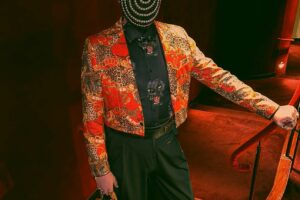
Once again, we’re back with the Parmigiani at the Teatro Regio and their Tutto Verdi project marking
the upcoming bicentennial of the great maestro’s birth. All these releases bear the humble recommendation from a Frankfurt news outlet, the name of which is nearly unpronounceable, that says,”This is how Verdi should be played.” Not addressed, however, is a more important question: is this how Verdi should be staged and sung?
Verdi was fascinated with politics and I Due Foscari may be his most heavily “political” work, even more than Don Carlo and Simon Boccanegra, in which the characters at least enjoy moments of happiness in repose. Nearly all of Foscari has its dramatis personae embroiled in an imbroglio involving the accusation of murder made against the Doge’s son Jacopo Foscari.
The unhappiness of everyone involved is relentless and even Verdi himself judged the finished work too somber and not a success. Musically, although it rises to real magnificence in the Act II finale in the council chamber, it is an uneven work and we have the young Verdi still finding his way when it comes to vocal writing for the tenor and the soprano.
I’m embarrassed to admit that in spite of being a diagnosable opera recording hoarder I’ve never heard a note of this work and just on that level I found this performance to be a pleasure. Of course, now that Placido Domingo has embarked on his Foscari World Tour I have a feeling we’re all going to get to know it a lot better, whether we like it or not.
Filmed in 2009 and gleaned from two performances it makes a solid case for this opera inspite of its provincial pedigree which is acutely obvious to anyone who watches. This time the presentation is far clearer than the previous I Lombardi in this series and, inspite of a silent movie staged Prelude, sticks close to the composer’s intention.
The set and costume designs by William Orlandi betray their modest origins but still manage to be evocative. A shallow flight of stairs downstage to a simple wooden circle of risers for the council chamber with walls on a revolve that cover or reveal. A backdrop of Venice comes and goes as needed and then some prison cell bars downstage right for Act II Scene I.
Costumes are all monochromatic and their simplicity is an advantage to the overall staging in being able to identify social groups. The Members of the Council of Ten are all garbed in robes made of heinous red polyester organza with the Junta in black. Lucrezia, the lead soprano, and her maidservants are in satins of silver, gray and black with no jewelry. The one scene of Venetian revelry that opens Act III finds everyone masked wearing a new white organza slipcover over what they already have on.
The role of Jacopo Loredano, who sets most of the wickedness in action, is played by Roberto Tagliavini. He’s tall, slim and fairly young and although most of his role is really anchoring the ensembles he displays a solid basso that serves the music well. I can’t say that his work is particularly characterful but it’s promising.
This may sound ridiculous but it was love at first sight for me when Lucrezia’s confident, Pisana, walked on stage in the form of soprano Marcella Polidori. This handsome woman of a certain age is obviously making a career of what a friend of mine calls the “che avvenne ascolta?” roles. She moves with an innate grace and dignity that can’t be taught, and her exquisite facial and physical expressions of concern and entreatment prove her to be a mistress of her craft. She is the personification of what can be excellent in a provincial performance and I hope to see more of her work in this series. I wish I could tell you she has the most beautiful voice in the world but, once again, the role is almost completely lost in ensemble.
Here the tenore secondo from the Lombardi, Robert de Baisio has been promoted to primo in the role of the Doge’s son Jacopo Foscari. His voice is sturdy and strong with very little glamour in his tone. His opening aria “Dal piu remoto esilio” has some tricky ascending phrases that bring him grief. He does manage to rally for the very rousing cabaletta that follows in spite of dropping out completely in the final stretta so he can blastissimo on the last note.
His posture is uniformly horrible throughout the evening as it appears he thinks his voice emanates from his furrowed brow and he bends his body forward to facilitate that. By evening’s end he has a solid success that can only be faulted for lack of grace but certainly not power. He is a gold star graduate of the semaphore school of stage acting.
Tatiana Serjan as his wife Lucrezia is beset by another set of challenges all together. Verdi’s writing for soprano in this opera is for the most part the equivalent of a vocal booby trap. Her opening cavatina and cabaletta find her firing salvos of approximatura off the bow that never reach their intended destination. Her basic vocal quality through the middle to the bottom has a warm auburn coloring that’s alluring but she lacks a real trill and develops a serious flutter above the staff. She is a completely committed artist, not to mention a beautiful woman who knows how to wear a gown.
The 80 year old Doge of Venice is wrung dry of every last bit of pathos and emotion by the 67 year old Leo Nucci. Sadly, here is where we are presented with what is the most provincial measure of the evening. Mr. Nucci has always been an extremely canny singer and long after most of his contemporaries have retired we find him still in excellent vocal estate. His strengths and weaknesses have remained constant throughout his long career. He scoops up to every note above a D in order to keep his vocal center strong and avoid disconnecting the top. The very careful positioning of his mouth helps to keep his tone from spreading and evenly regulates his emission of breath. All of these tricks have preserved his baritone long past the intended shelf date.
His acting is done mostly with his voice and a palsied right hand. I’ve always found his timbre to be a jot on the dry side but he is an absolute tower of strength from his first entrance all the way until his grand scena,”Questa dunque é l’iniqua mercede” in the finale of Act III.
He receives a rousing ovation for this from an obviously appreciative audience and suddenly Mr. Nucci completely forgets he’s in the middle of an performance, drops any pretense at characterisation, and gives himself a couple of big, smiling, bows. He also graciously acknowledges the orchestra, conductor and his colleagues on stage. If only he’d waited the less than 10 minutes until the actual finale of the opera I would have applauded all the harder. Nothing less than shocking until I realized: forget it, Jake, it’s Parma.
The stage director Joseph Franconi Lee manages to group everyone in a painterly fashion onstage making for some lovely tableaux. The Venetian barcarolle at the beginning of Act II is a bit of a mess from a staging standpoint and the choreography of Marta Ferri and the lackluster group of dancers she’s been given don’t bolster the mood. Lighting by Valerio Alfieri is mildly evocative and there’s a complete lack of follow spots which I found refreshing.
Maestro Donato Renzetti looks like your favorite uncle as he cheerfully saunters into the pit. He and the orchestra give an uncommonly strong reading of this work that goes a long way towards filling in the blanks of this uneven score. Picture is sharp and sound offers standard PCM and DTS 5.1 options. I feel confident that this is, inspite of its provincial origins, a good, but not great, rendering of a work that deserves a wider hearing.



























Comments